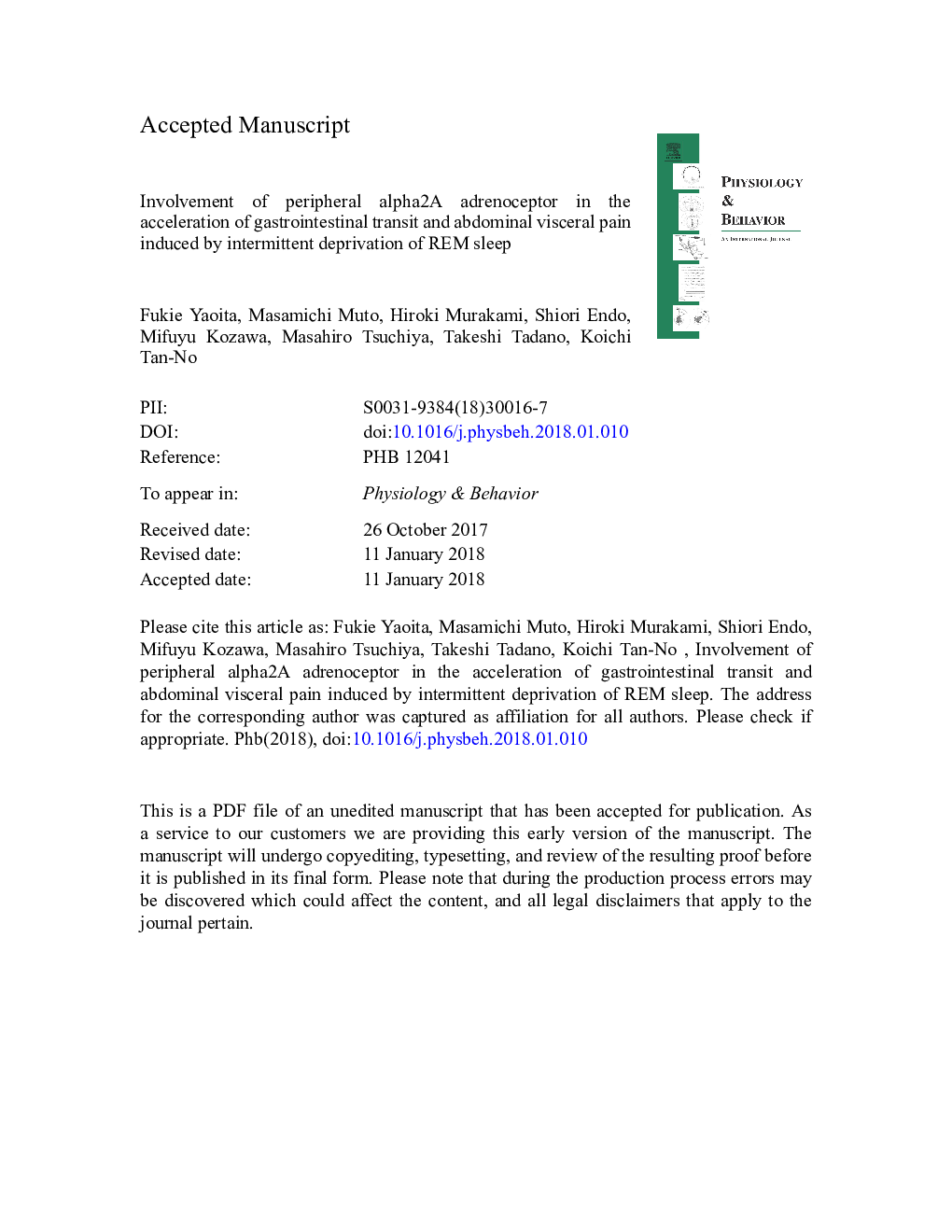| کد مقاله | کد نشریه | سال انتشار | مقاله انگلیسی | نسخه تمام متن |
|---|---|---|---|---|
| 8650639 | 1571133 | 2018 | 49 صفحه PDF | دانلود رایگان |
عنوان انگلیسی مقاله ISI
Involvement of peripheral alpha2A adrenoceptor in the acceleration of gastrointestinal transit and abdominal visceral pain induced by intermittent deprivation of REM sleep
دانلود مقاله + سفارش ترجمه
دانلود مقاله ISI انگلیسی
رایگان برای ایرانیان
کلمات کلیدی
موضوعات مرتبط
علوم زیستی و بیوفناوری
بیوشیمی، ژنتیک و زیست شناسی مولکولی
فیزیولوژی
پیش نمایش صفحه اول مقاله

چکیده انگلیسی
Many studies have associated sleep alterations with the severity of irritable bowel syndrome (IBS) symptoms, but the direct pathophysiological relationship has not been clarified. In addition, alterations in noradrenergic signaling have been implicated in the pathophysiology of IBS, and alpha2-adrenoceptors are potential treatment targets. We have previously shown that acceleration of gastrointestinal transit (GIT) elicited by intermittent rapid eye movement (REM) sleep deprivation stress may fulfill the profile of a model of IBS. Moreover, we showed hypernoradrenergic function in the brain of sleep-deprived mice. On the other hand, acetic acid-induced writhes indicate visceral pain features of IBS model animals. In this study, using mice, we investigated whether intermittent REM sleep deprivation stress causes changes in acetic acid-induced writhing and whether the number of writhes and GIT are improved by administration of the hydrophilic clonidine analogue, ST-91. Mice were deprived of REM sleep intermittently using the small-platform method (20Â h/day) for 3Â days. The intermittent REM sleep deprivation stress elicited acceleration of GIT and the increased number of writhes was significantly improved by ST-91 treatment. The ID50 values of ST-91 on the GIT in cage-control mice and intermittent REM sleep-deprived mice were 0.24 and 0.70Â mg/kg, respectively. In addition, the ID50 values of ST-91 on the writhes in cage-control mice and intermittent REM sleep-deprived mice were 0.52 and 0.73Â mg/kg, respectively. Further, the expression of alpha2A-adrenoceptor was decreased in the distal ileum of intermittent REM sleep-deprived mice compared to that in cage-control mice. Moreover, the effects of ST-91 on GIT and writhes in cage-control and intermittent REM sleep-deprived mice were decreased by the administration of BRL44408 (6Â mg/kg, i.p.), a selective alpha2A-adrenoceptor antagonist, and not by the administration of imiloxan (3Â mg/kg, i.p.), or JP-1302 (3Â mg/kg, i.p.), selective alpha2B-and alpha2C-adrenoceptor antagonists, respectively. These results suggest that the increase in GIT and writhes induced by intermittent REM sleep deprivation stress may serve as a model of diarrhea and visceral pain symptoms in IBS. Further, the onset of these symptoms may be related to the hypofunction of peripheral alpha2A-adrenoceptor.
ناشر
Database: Elsevier - ScienceDirect (ساینس دایرکت)
Journal: Physiology & Behavior - Volume 186, 15 March 2018, Pages 52-61
Journal: Physiology & Behavior - Volume 186, 15 March 2018, Pages 52-61
نویسندگان
Fukie Yaoita, Masamichi Muto, Hiroki Murakami, Shiori Endo, Mifuyu Kozawa, Masahiro Tsuchiya, Takeshi Tadano, Koichi Tan-No,